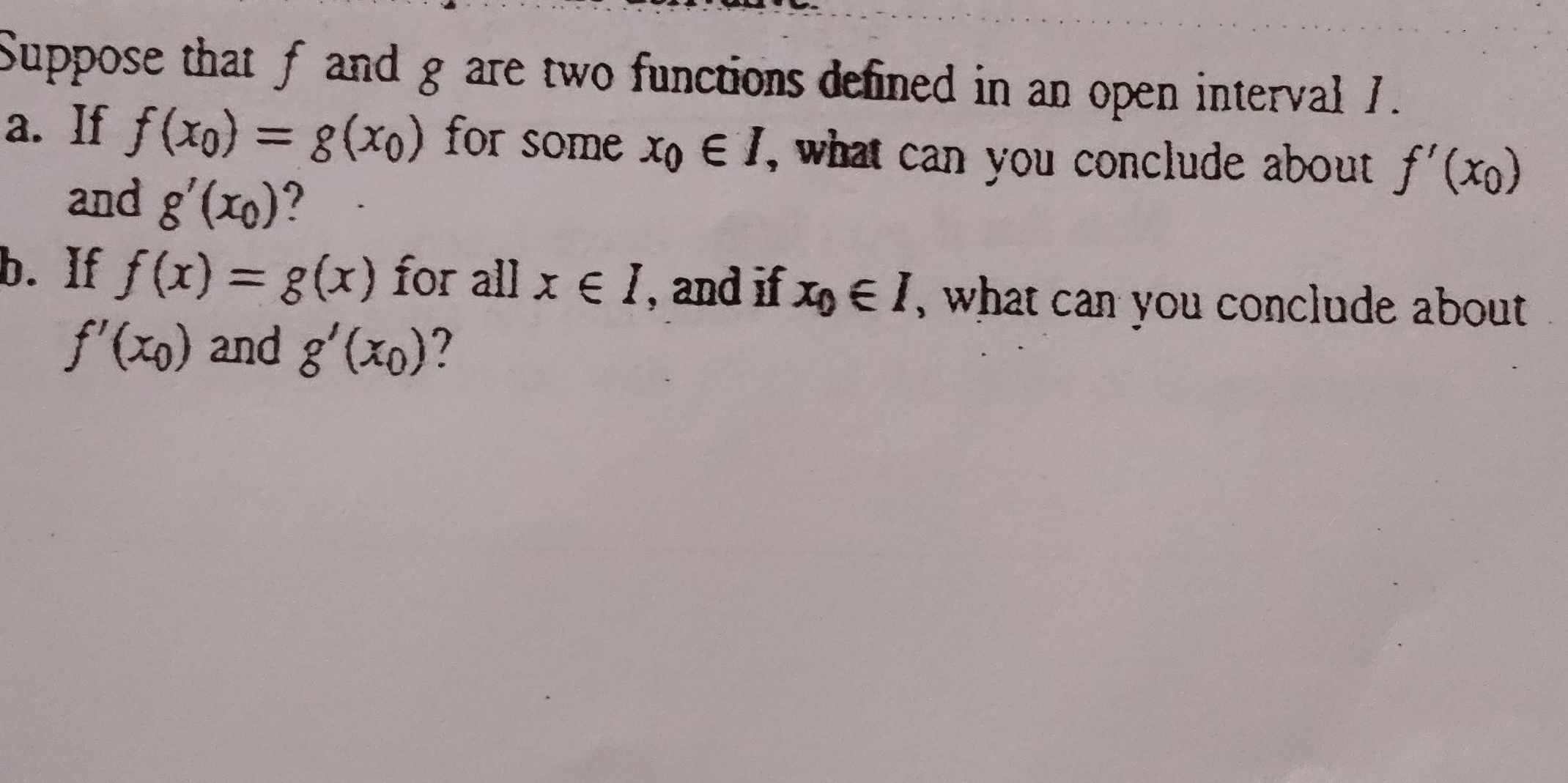Suppose that f and g are two functions defined in an open interval I. a. If f(x0) = g(x0) for some x0 ∈ I, what can you conclude about f'(x0) and g'(x0)? b. If f(x) = g(x) for all... Suppose that f and g are two functions defined in an open interval I. a. If f(x0) = g(x0) for some x0 ∈ I, what can you conclude about f'(x0) and g'(x0)? b. If f(x) = g(x) for all x ∈ I, and if x0 ∈ I, what can you conclude about f''(x0) and g''(x0)?

Understand the Problem
The question is asking about the relationships between the derivatives of two functions, f and g, under certain conditions regarding their equality at a point or over an interval. It asks what can be concluded about the first and second derivatives of these functions based on the provided conditions.
Answer
a. No conclusion for $f'(x_0)$ and $g'(x_0)$. b. $f'(x_0) = g'(x_0)$ and $f''(x_0) = g''(x_0)$.
Answer for screen readers
a. No conclusion can be made about $f'(x_0)$ and $g'(x_0)$.
b. $f'(x_0) = g'(x_0)$ and $f''(x_0) = g''(x_0)$ for all $x_0 \in I$.
Steps to Solve
-
Understanding the conditions for part a
Given that $f(x_0) = g(x_0)$ for some specific point $x_0 \in I$, we can conclude that $f$ and $g$ have the same value at that point. However, we cannot directly infer anything about their derivatives $f'(x_0)$ and $g'(x_0)$ unless we establish additional conditions, like continuity or differentiability. -
Derivatives and their relationship
The equality $f(x_0) = g(x_0)$ does not imply that the derivatives $f'(x_0)$ and $g'(x_0)$ are also equal. The functions may change slopes independently. Thus, there is no definitive conclusion about $f'(x_0)$ and $g'(x_0)$ based solely on the equality of the functions at a single point. -
Understanding the conditions for part b
For part b, since $f(x) = g(x)$ for all $x \in I$, this means that the two functions are identical over the entire interval $I$. -
Conclusion about derivatives
If two functions are identically the same on an interval, their derivatives must also be the same at every point in that interval. Therefore, we can conclude that $f'(x_0) = g'(x_0)$ for any point $x_0 \in I$. -
Conclusion about second derivatives
Since both functions are identically the same, this equality extends to their second derivatives as well. Therefore, it also follows that $f''(x_0) = g''(x_0)$ for any $x_0 \in I$.
a. No conclusion can be made about $f'(x_0)$ and $g'(x_0)$.
b. $f'(x_0) = g'(x_0)$ and $f''(x_0) = g''(x_0)$ for all $x_0 \in I$.
More Information
The results follow from the properties of differentiability and equality of functions. If two functions are equal at a point, their derivatives may not match unless further conditions are met. However, if two functions are equal everywhere in an interval, their derivatives and higher-order derivatives must also be equal in that interval.
Tips
- Assuming that equality at a single point means equality of derivatives at that point. This is incorrect without additional conditions.
- Overlooking that if two functions are equal over an interval, then all derivative orders must also match.
AI-generated content may contain errors. Please verify critical information